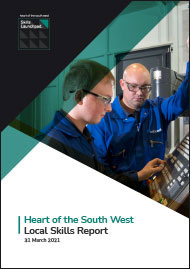2 Skills Advisory Panels – Introduction
Skills Advisory Panels (‘SAPs’) bring together employers, skills providers and key local stakeholders to better understand and resolve skills mismatches at a local level. There are 36 SAPs across England as part of Local Enterprise Partnerships and Mayoral Combined Authorities.
The Department for Education (DfE) supports SAPs with grant funding primarily to produce high quality analysis of local labour markets and Local Skills Reports. The Reports set out the local strengths and skills needs and how the SAP proposes its area addresses its key priorities. The Reports aim to influence local partners and feed intelligence to central government, including the national-level Skills and Productivity Board (SPB).
In January 2021, DfE published its White Paper “Skills for Jobs: Lifelong Learning for Opportunity and Growth,” which set out a number of reforms aimed at putting employers more firmly at the heart of the skills system. The White Paper outlined plans to test in 2021-22, in a small number of areas, “Local Skills Improvement Plans” created by business representative organisations.
The White Paper committed to build on the work of SAPs to date. SAPs and their Local Skills Reports will continue as the DfE trailblazes “Local Skill Improvement Plans” and until any potential changes are made to a SAP’s remit and responsibilities.
The Heart of the South West Skills Advisory Panel is the strategic partnership for skills and employment within the Heart of the South West area (covering Somerset, Devon, Plymouth and Torbay). Its members include the Heart of the South West Local Enterprise Partnership (‘HotSW LEP’), Local Employment and Skills Board, Colleges and University Partners, and wider public and private sector representatives and organisations.
The SAP partnership in the HotSW follows on from the previous LEP People Leadership Group, through which partners have worked closely together over the past five years to align and accelerate delivery. The period has seen a mixture of public, private and institutional investment that has sought to enhance local progression and reinforce the area’s underlying labour market expertise and specialisation. Key developments have included:
- South West Institute of Technology (‘IoT’) Successfully secured in 2019, the South West IoT brings together further and higher education partners with regionally and national significant private sector partners to advance technical skills delivery and development across the economy. With a focus upon advanced engineering and digital competencies, the IoT offers local partners and businesses a unique opportunity to fast track the development and growth of core technical competencies in our opportunity sectors.
- Sector Skills Investment Over the past five years, further and higher education partners across the HotSW have invested over £250m into specialist capacity and facilities to advance learning and expertise within our core sectors. These include:
- New engineering, digital and technology centres in Exeter, Bridgwater, Torbay and Plymouth;
- National Centres of excellence around Nuclear, Marine and other advanced manufacturing, construction and engineering approaches;
- Investment into higher education facilities in Exeter, Plymouth and Taunton;
- New investment in space for additional innovation and enterprise across the wider HotSW.
- HotSW Careers Hub Emerging from the work of the Careers Enterprise Company and Gatsby Foundation, the HotSW Career Hub as of September had grown to cover every mainstream secondary school in the area, providing support for high quality careers, advice and guidance and business/education engagement to every student. The largest hub in the UK, the HotSW Careers Hub has developed nationally competitive expertise in supporting work experience and engagement with business.
- Digital Skills Partnership One of two original pilots agreed with DCMS in 2018, the HotSW Digital Skills Partnership brings together partners from across the public and private sector with a focus on digital skills development and capacity. Securing over £3.5m of funding in its lifetime towards local delivery to date, and facilitating wider success across careers advice, business support and infrastructure opportunities. The DSP has taken a strong leadership role in promoting digital pathways and the uptake of digital skills from basic to higher level.
- Delivery of the European Social Fund HotSW partners have been successful over the past 4 years in committing over £44m of ESF funding across a range of high value / high need projects. These include joint working with key national partners such as the Education and Skills Funding Agency (‘ESFA’) and Big Lottery, universities and colleges, and wider community and voluntary organisations. As of 2020, the HotSW programme had supported over 20,000 individuals to access an apprenticeship, develop their in-work skills, return to work and training and progress more generally.
- National Retraining Scheme / Skills Fund Pilot Activity Working closely with the Department of Education (‘DfE’) since 2017 on the emerging development of the National Retraining Fund and subsequent policy, HotSW partners have contributed towards the delivery of 1,500 adult training places in the past three years as part of wider testing and roll out of the Government’s update skills approach. This includes testing of forerunner approaches to the lifetime guarantee offer at Level 3, and most recently bootcamp approaches for core sectors.


